The summonses nominate a date and a time at which two Reuters journalists and a Reuters company representative will be required to present themselves to police, the investigating officer, Lieutenant Somkid On-Jan of Phuket's Vichit Police Station, said today.
If there is no appropriate response, those named are liable to be arrested.
The case is being brought by the Royal Thai Navy which alleges criminal defamation and a breach of Thailand's Computer Crimes Act. Conviction carries a penalty of up to seven years' jail and a fine of 100,000 baht.
Two journalists from Phuketwan were similarly ordered to present themselves in December and have since been charged.
Both Navy actions concern a single paragraph from a Reuters special report on the Rohingya boatpeople.
The report was published by Reuters on July 17 last year. Phuketwan carried excerpts, including the 41-word paragraph, in a news report later the same day.
The Royal Thai Navy also lodged complaints about both news organisations with Phuket police on July 17.
News of the unprecedented case was made public in December when Phuketwan journalists Chutima Sidasathian and Alan Morison were ordered to appear at the Vichit Police Station.
At the time, the Phuketwan journalists (Case No. 489) were told that Reuters (Case No. 490) would also be charged. However, the Reuters case was delayed for months because the police paperwork was initially sent to the Department of Justice in Bangkok.
Phuket police wrongly believed that Reuters, which is understood to have about 1000 staff in Bangkok, was based overseas. The Bangkok street protests that interfered with many aspects of administration in Thailand also delayed progress in the Reuters case, until now.
In the meantime, Reuters has gone on to win the Pulitzer Prize, journalism's highest honor, for its coverage of the Rohingya, which Phuketwan has also been reporting for seven years.
The Pulitzer board commended journalists Jason Szep and Andrew R.C. Marshall last month for their '''courageous reports''' and noted that the Rohingya in fleeing Burma (Myanmar) ''often fall victim to predatory human trafficking networks''.
Jason Szep and Stuart Grudgings were bylined on the Reuters special report of July 17. That report by the pair was placed at the top of the list in the links on the Pulitzer site to all of the articles in the award-winning series.
Mr Szep was the Bangkok bureau chief at the time the Rohingya series was written. He has since been transferred to Washington. Mr Grudgings was the Kuala Lumpur correspondent.
The Royal Thai Navy and journalists from Phuketwan have since met separately with Thailand's Human Rights Commission. Morison and Khun Chutima are to appear before Thailand's Law Reform Commission on May 22.
The Phuketwan pair are due to reappear in court on May 26. They spent five hours in cells beneath Phuket Provincial Court on April 17 as part of the process that freed them on bail of 100,000 baht each.
The unusual suit raises questions about whether any organisation that carries news agency copy could be held liable in Thailand, where defamation, usually a civil matter, can involve criminal prosecution.
Reuters has been criticised for not speaking out in defence of its soon-to-win-a-Pulitzer paragraph in December, at the time the two Phuketwan journalists were charged.
Under Thailand's controversial Computer Crimes Act, once a charge is laid it cannot be withdrawn and must proceed to court. Morison, charged both as a reporter and as a director of Phuketwan's parent company, Big Island Media, faces twice the penalty.
Navy Uses Computer Crimes Act to Sue:
http://phuketwan.com/tourism/navy-captain-uses-computer-crimes-act-sue-journalists-criminal-defamation-19413//
The Nation Cartoon in Full:
http://www.nationmultimedia.com/specials/nationphoto/show.php?id=30&pid=16667/
Phuket Reporters Prepared for Prison:
http://www.bangkokpost.com/news/local/387125/reporters-prepared-for-prison-in-navy-defamation-lawsuit/
United Nations
''Criminal prosecution for defamation has a chilling effect on freedom of the press,'' said Ravina Shamdasani, the spokesperson for the Office of the High Commissioner for Human Rights. ''International standards are clear that imprisonment is never an appropriate penalty for defamation.''
Human Rights Watch
''The Thai navy's lawsuit is a reckless attempt to curtail journalists' reporting on alleged human trafficking by its officers,'' said Brad Adams, Asia director at Human Rights Watch. ''Unless the government withdraws the case, its impact will be felt far beyond those reporting on abuses against the Rohingya - and could have a choking effect on all investigative reporting in Thailand.''
Reporters Without Borders
"It is intolerable that journalists are being prosecuted for just doing their job by relaying information of general interest that had already been made public," Reporters Without Borders said. "Bringing charges under the controversial Computers Crimes Act in a defamation case is indicative of the critical state of freedom of information in Thailand and amounts to an attempt to gag the media. We support these journalists, who are facing a jail term, and we call for the immediate withdrawal of these proceedings."
Committee to Protect Journalists
''Rather than shooting the messenger, the Royal Thai Navy would be better suited launching an internal investigation into the serious allegations of abuse that have been raised,'' said Shawn Crispin, CPJ's senior Southeast Asia representative. ''This type of legal intimidation aims ultimately at discouraging media reporting on allegations of serious human rights abuses.''
Chris Lewa, director of the rights group the Arakan Project
''Thanks to the fair investigative reporting by the Phuketwan journalists, the involvement of various Thai agencies in the massive smuggling and trafficking operations of Rohingya refugees and their related miseries is no more a secret. Rights groups should unite to call on Thailand to quash these defamation charges.''
Phuketwan
''We wish the Royal Thai Navy would clear its reputation by explaining precisely what is happening to the Rohingya in the Andaman Sea and in Thailand,'' Phuketwan said in a statement released in response to the charges. ''By instead using a controversial law against us, the Navy is, we believe, acting out of character.''
Bangkok Post
The action makes the navy look like a bully, and gives the impression the admirals would like to intimidate the media. Instead of defending the navy's honor, the criminal defamation suit holds it to question. Instead of silencing the media about the story - concerning the navy's role in the mistreatment of Rohingya boatpeople - the lawsuit repeats it, to more people and at greater length.
CNN
Morison said: "The navy's action over one paragraph has created a perfect storm. If the navy proceeds with the case, the Rohingya issue is now tied up in their action against media under a controversial law."
TIME
In the meantime, calmer seas mean that even more Rohingya are expected to attempt the treacherous journey in the weeks ahead. Nothing could gladden the traffickers more.
Reuters
Barb Burg, Reuters' global head of communications: ''Our story was fair and balanced and Reuters has not been accused of criminal libel.''
Bill Barnett (The Phuket Insider)
The issues which have drawn Phuketwan into this fray are profound and disturbing. There should be no need to wax over reality and respect needs to be given to those who stand up for the helpless who cannot help themselves.
Andrew Drummond (Investigative Journalist)
We should all support journalists who are doing a difficult job here under laws which best suit a totalitarian state.
Excellence in Human Rights Reporting, Investigative Reporting awards
In 2010 the Phuketwan team shared the Society of Publishers in Asia Award for Excellence in Investigative Reporting and a second Award for Excellence in Human Rights Reporting, with the South China Morning Post newspaper. Judges said of the Excellence in Investigative Reporting award: ''An excellent series that uncovered serious government abuses and had a material impact in correcting them. Exclusivity. Strong reporting. Hard-hitting piece with international implications.''
Of the Excellence in Human Rights Reporting award, the judges said: ''Excellent investigative work that exposed serious human rights abuses of oppressed people. Intrepid reporting of a hidden subject. This is a high-caliber series buttressed by solid on-the-ground reporting and great pictures. All militaries are challenging subjects for investigative reporters and Thailand's is no exception. The team clearly went to great lengths to get sources, break news, and provide the details that prodded the government into action.''

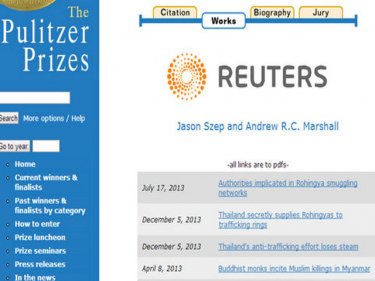
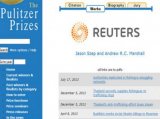


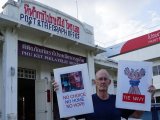









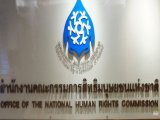
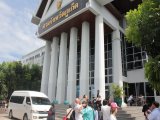



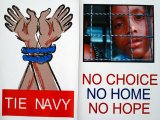






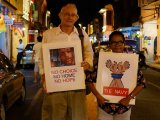


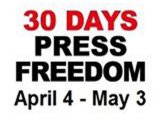
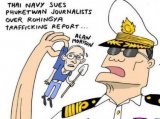
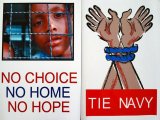

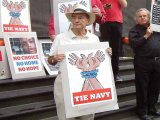


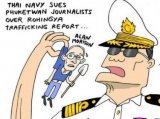


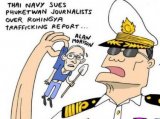
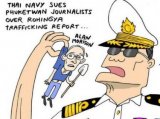
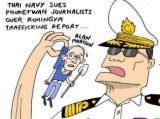
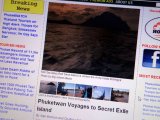





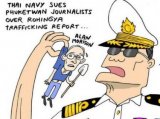














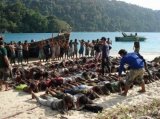




Dear Royal Thai Navy
Do you really think it wise to prosecute an international news agency for an article that they won the Pulitzer Prize for !?!?! Seriously !?!
Amazing Thailand doesn't really cut it anymore.
Posted by James on May 12, 2014 17:17